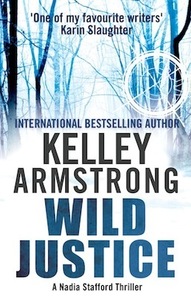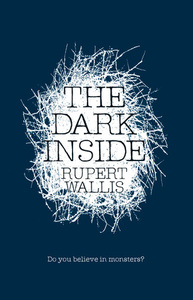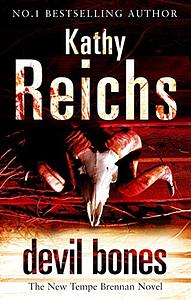Take a photo of a barcode or cover
patchworkbunny's Reviews (2.12k)
Jack brings Nadia an offering, a file on the man who raped and killed her cousin and got away with it. If she wants, she can kill him, or Jack will do the honour. But stirring up the past brings Nadia face to face with some harsh truths and someone is out to get her.
It’s been such a long time since the last Nadia Stafford book, I had given up hope of getting more but I am so glad Kelley Armstrong decided to finish off her story. I always enjoyed the tenuous relationship between Nadia and her mentor, Jack, and here we get some closure and well as delving into her uncomfortable past, the very reason she became a professional killer in the first place.
If you never liked Jack, you may be in for a disappointment. This is mostly about the tentative relationship between him and Nadia. He is still gruff and economical with his words, but his sentences do get longer…well, yes he speaks in sentences. In the previous book, Nadia had realised she wanted more from him than the fatherly, mentor role he provided but was clear that he didn’t want the same. He’s a lone wolf, but one that’s aging in a profession that doesn’t take kindly to age. That foundation is built upon in Wild Justice and I thoroughly enjoyed the dynamics between them.
As for the thriller side. They’re hitmen (or hitpersons, not sure what you’re meant to call them) so there is a certain amount of subterfuge and killing, but I think Kelley’s voice shines through it all. Nadia is often the first to point out the clichés or schoolboy errors that others might make or think about when it comes to her profession. The warmth in her characters is the same as her other series, and makes this trilogy one to read even if thrillers aren’t your thing.
It’s been such a long time since the last Nadia Stafford book, I had given up hope of getting more but I am so glad Kelley Armstrong decided to finish off her story. I always enjoyed the tenuous relationship between Nadia and her mentor, Jack, and here we get some closure and well as delving into her uncomfortable past, the very reason she became a professional killer in the first place.
If you never liked Jack, you may be in for a disappointment. This is mostly about the tentative relationship between him and Nadia. He is still gruff and economical with his words, but his sentences do get longer…well, yes he speaks in sentences. In the previous book, Nadia had realised she wanted more from him than the fatherly, mentor role he provided but was clear that he didn’t want the same. He’s a lone wolf, but one that’s aging in a profession that doesn’t take kindly to age. That foundation is built upon in Wild Justice and I thoroughly enjoyed the dynamics between them.
As for the thriller side. They’re hitmen (or hitpersons, not sure what you’re meant to call them) so there is a certain amount of subterfuge and killing, but I think Kelley’s voice shines through it all. Nadia is often the first to point out the clichés or schoolboy errors that others might make or think about when it comes to her profession. The warmth in her characters is the same as her other series, and makes this trilogy one to read even if thrillers aren’t your thing.
In a post-apocalyptic world razed by natural disaster, war and pestilence, the state formally known as Arizona is governed by The Church. Preachers hunt down those who have sinned and offer two choices. Death or purgatory. Lead is one such preacher. He carries out the will of God without question until one day he is ordered to apprehend another preacher.
The Zona is a short but thought provoking story. At the start, Lead has been bound to a rock in the heat of the barren Zona desert. We don't know if he is being punished for being a preacher or for sinning in the eyes of The Church. The clock is rewound and the story is told from the day Lead started to doubt as well as the use of framed narrative to explain what has happened to the world.
The preachers answer to no one. They say that God speaks to them direct but gives no reasons for punishment. To displease the preachers is to sin and sins must be punished. It's a scary thought and the back-story is believable. One horrific event set the world in chaos and people took advantage. Over time, one bad thing triggers another until the world is unrecognisable.
It highlights that justice and religious belief should be kept separate. That the fear of a god is not the right way to rule and in the hands of the corrupt, religion can be a weapon against those they wish to silence. The people of The Zona are not free to believe in what they wish and the religion forced upon them is not one they wish to follow. I think you only have to look around the world in recent years to find that can happen.
The Zona is a short but thought provoking story. At the start, Lead has been bound to a rock in the heat of the barren Zona desert. We don't know if he is being punished for being a preacher or for sinning in the eyes of The Church. The clock is rewound and the story is told from the day Lead started to doubt as well as the use of framed narrative to explain what has happened to the world.
The preachers answer to no one. They say that God speaks to them direct but gives no reasons for punishment. To displease the preachers is to sin and sins must be punished. It's a scary thought and the back-story is believable. One horrific event set the world in chaos and people took advantage. Over time, one bad thing triggers another until the world is unrecognisable.
It highlights that justice and religious belief should be kept separate. That the fear of a god is not the right way to rule and in the hands of the corrupt, religion can be a weapon against those they wish to silence. The people of The Zona are not free to believe in what they wish and the religion forced upon them is not one they wish to follow. I think you only have to look around the world in recent years to find that can happen.
Partridge has taken his father’s place in the dome. This is his chance to bring about change. But it’s not as easy as he seems and whilst separated from his new friends, the tempers in and outside the dome are fraying.
Burn highlights how replacing the person at the top doesn’t make it easy to change things. There are other people, existing prejudices and instability which means no matter how good your intentions, you might not be able to fix things. It might be a rather bleak story but it’s a refreshing change from rose-tinted world-building.
Whilst Partridge’s precarious position within the dome was a far too believable scenario, I did think he was a bit too easily steered in some cases. I wanted him to resist more, to fight harder for Lyda, to maybe suspect people wanted them apart. That the plan to put him with Iralene wasn’t for the sake of the people at all.
After El Capitan proclaimed his love for Pressia, it would have been all too easy to turn him against her and make him into someone else. But he is good and kind, a stark contrast to the character we were first introduced to. I had almost forgotten his past until it was brought up in the later stages. Him and his constant companion, Helmud, are still the best bits, even moving me to tears and keeping me on tenterhooks for their safety.
Pressia is still worrying about Bradwell and his reaction to his transformation; one that she caused. I never felt their relationship was central to the plot though. This is one of the few trilogies where the switching viewpoints works and I am equally invested in each character’s story. The pace is fast throughout and it kept me up past my bedtime!
I don’t it’s a conclusion that’s going to please everyone but it’s moving and dark and complex. The lines are blurred and there is some heartbreak. Yet there are some heart-warming moments amongst the ash and grief. It might be the end of Pressia’s story but there is so much more potential in this world I’d love a standalone from another point of view, following on from Burn or further on in the timeline.
Review copy provided by publisher.
Burn highlights how replacing the person at the top doesn’t make it easy to change things. There are other people, existing prejudices and instability which means no matter how good your intentions, you might not be able to fix things. It might be a rather bleak story but it’s a refreshing change from rose-tinted world-building.
Whilst Partridge’s precarious position within the dome was a far too believable scenario, I did think he was a bit too easily steered in some cases. I wanted him to resist more, to fight harder for Lyda, to maybe suspect people wanted them apart. That the plan to put him with Iralene wasn’t for the sake of the people at all.
After El Capitan proclaimed his love for Pressia, it would have been all too easy to turn him against her and make him into someone else. But he is good and kind, a stark contrast to the character we were first introduced to. I had almost forgotten his past until it was brought up in the later stages. Him and his constant companion, Helmud, are still the best bits, even moving me to tears and keeping me on tenterhooks for their safety.
Pressia is still worrying about Bradwell and his reaction to his transformation; one that she caused. I never felt their relationship was central to the plot though. This is one of the few trilogies where the switching viewpoints works and I am equally invested in each character’s story. The pace is fast throughout and it kept me up past my bedtime!
I don’t it’s a conclusion that’s going to please everyone but it’s moving and dark and complex. The lines are blurred and there is some heartbreak. Yet there are some heart-warming moments amongst the ash and grief. It might be the end of Pressia’s story but there is so much more potential in this world I’d love a standalone from another point of view, following on from Burn or further on in the timeline.
Review copy provided by publisher.
It’s Leonard Peacock’s birthday. He is planning on killing himself and taking out Asher Beal, his onetime friend. But first he must say goodbye. He carefully wraps gifts for his four friends; his elderly Bogart obsessed neighbour, a teenage violinist from Iran, an evangelist girl he meets at the station and his favourite teacher.
Forgive Me, Leonard Peacock is heartbreaking from the start; what would drive a teenage boy to do such a thing on his 18th birthday? The writing is angsty yet immensely believable. Leonard doesn’t come across as a boy you would instantly like and it’s difficult to empathise with someone so hell bent on murder. But as he hands out his gifts and reveals what happened to get him where he is mentally, he grows on you.
His collection of oddball friends paints a picture of a boy with goodness in his heart deep down. That he befriends an old and lonely neighbour and regularly goes round to watch Humphrey Bogart films together shows he can show compassion. I liked how they communicated through Bogart quotes when it was just too hard for them to speak the truth. I laughed at his infatuation with the girl who would only date a Christian when he battles with his atheist beliefs and the chance of a kiss. And Herr Silverman is the kind of teacher you hope every troubled student has around to speak to.
The story is interspersed with Leonard’s letters from the future. It’s clear enough from the style that they are supposedly written by him as they do have a certain unpolished quality. This did mean I felt they interrupted the flow a little and to be honest, I started skimming over them. It was a nice idea, and might work better for younger readers who can see their own writing mirrored on the pages. However you can read Matthew Quick’s excellent letter to his teen self here.
Of course, I won’t tell you whether or not he goes through with his plan. You’ll have to read the book to find out.
Forgive Me, Leonard Peacock is heartbreaking from the start; what would drive a teenage boy to do such a thing on his 18th birthday? The writing is angsty yet immensely believable. Leonard doesn’t come across as a boy you would instantly like and it’s difficult to empathise with someone so hell bent on murder. But as he hands out his gifts and reveals what happened to get him where he is mentally, he grows on you.
His collection of oddball friends paints a picture of a boy with goodness in his heart deep down. That he befriends an old and lonely neighbour and regularly goes round to watch Humphrey Bogart films together shows he can show compassion. I liked how they communicated through Bogart quotes when it was just too hard for them to speak the truth. I laughed at his infatuation with the girl who would only date a Christian when he battles with his atheist beliefs and the chance of a kiss. And Herr Silverman is the kind of teacher you hope every troubled student has around to speak to.
The story is interspersed with Leonard’s letters from the future. It’s clear enough from the style that they are supposedly written by him as they do have a certain unpolished quality. This did mean I felt they interrupted the flow a little and to be honest, I started skimming over them. It was a nice idea, and might work better for younger readers who can see their own writing mirrored on the pages. However you can read Matthew Quick’s excellent letter to his teen self here.
Of course, I won’t tell you whether or not he goes through with his plan. You’ll have to read the book to find out.
Becca is a great narrator for these books, she seems so real and likeable. A normal, well-adjusted girl who just happens to have some very unusual powers. Her voice carries through the text and makes The Seers really readable, even though the pace was too slow for me. There’s a lot going on, which takes a while to all come together.
I liked seeing a platonic friendship form between girl and boy for once. This thread was my favourite part and probably made me slightly more annoyed with Alex and his jealousy. The strength of the anam bond means he has nothing to worry about and, whilst a twinge of jealousy is kind of understandable, his actions don’t make sense. Logically, Becca is open and doing what needs to be done and it practically impossible for them to cheat on each other.
It is difficult to carry on an interesting romantic storyline once the characters have got together and I get that this was an attempt to put some relationship stuff in. Yet I don’t think it was really needed. They could be getting along fine and dandy and focusing on the mystery and danger.
It’s great to see the Holder powers being explored a bit more and the climactic rescue was great. Down to a hair incident that I disproportionally loved. And I do like the world. It just took a long time coming. Hopefully in further adventures, Alex and Becca will be more sure of themselves and get on with living this exciting life they have.
Review copy provided by publisher.
I liked seeing a platonic friendship form between girl and boy for once. This thread was my favourite part and probably made me slightly more annoyed with Alex and his jealousy. The strength of the anam bond means he has nothing to worry about and, whilst a twinge of jealousy is kind of understandable, his actions don’t make sense. Logically, Becca is open and doing what needs to be done and it practically impossible for them to cheat on each other.
It is difficult to carry on an interesting romantic storyline once the characters have got together and I get that this was an attempt to put some relationship stuff in. Yet I don’t think it was really needed. They could be getting along fine and dandy and focusing on the mystery and danger.
It’s great to see the Holder powers being explored a bit more and the climactic rescue was great. Down to a hair incident that I disproportionally loved. And I do like the world. It just took a long time coming. Hopefully in further adventures, Alex and Becca will be more sure of themselves and get on with living this exciting life they have.
Review copy provided by publisher.
Yerzhan is a young boy, growing up on the remote steppe of Soviet Kazakhstan where nuclear weapons are tested on his doorstep. He intends to marry the girl next door, the only girl next door for miles and he has a talent for music. But when he dives into a polluted lake, the water changes him. Yerzhan will never grow into a man.
The writing is beautifully evocative, creating a vivid picture of the wildness of the steppe and the culture of Yerzhan’s family. Their life in isolation is simple and timeless, the period only set by the Cold War and its atomic legacy.
The explosions are both a horror and something in the background. Something that just is and the families get on with their everyday lives against a backdrop of dread. Uncle Shaken argues that the nuclear experiments are their communist duty; they must not be left behind the Americans, but mostly, the explosions don’t impact their simple lives as much as you would think. Not until Yerzhan goes for his swim in polluted waters. It’s interesting to think that something we would be terrified of, nuclear bombs, is just part of normal life.
Of course, it is also a story about a boy and a girl. A boy who doesn’t grow up whilst she becomes taller than her father. A boy who is left behind; a common fear of adolescence. Yerzhan also becomes obsessed with the stories of Gesar, relating them to his life.
Review copy provided by publisher.
The writing is beautifully evocative, creating a vivid picture of the wildness of the steppe and the culture of Yerzhan’s family. Their life in isolation is simple and timeless, the period only set by the Cold War and its atomic legacy.
The explosions are both a horror and something in the background. Something that just is and the families get on with their everyday lives against a backdrop of dread. Uncle Shaken argues that the nuclear experiments are their communist duty; they must not be left behind the Americans, but mostly, the explosions don’t impact their simple lives as much as you would think. Not until Yerzhan goes for his swim in polluted waters. It’s interesting to think that something we would be terrified of, nuclear bombs, is just part of normal life.
Of course, it is also a story about a boy and a girl. A boy who doesn’t grow up whilst she becomes taller than her father. A boy who is left behind; a common fear of adolescence. Yerzhan also becomes obsessed with the stories of Gesar, relating them to his life.
Review copy provided by publisher.









